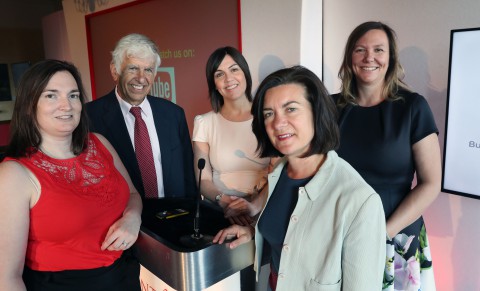
Minister thanks Wales’ training providers but wants more to boost skills

Left – Right: Sarah Harris, Assistant Director (Vocational Qualifications), WJEC; Dr John Graystone, Executive Chair of the Board, Agored Cymru; Andrea Melvin, Head of Learner Provision, Skills, Higher Education and Lifelong Learning, Welsh Government; Eluned Morgan AM, Minister for Welsh Language and Lifelong Learning and Sarah John, Chair, NTfW.
Minister for Welsh Language and Lifelong Learning, Eluned Morgan gave work-based learning providers across Wales a big pat on the back at their annual conference before challenging them to do even more to generate a highly skilled workforce.
More than 180 delegates gathered at the Celtic Manor Resort, Newport to hear the Minister and a series of speakers refer to the changing employment landscape in Wales that is creating new demands on training providers.
Themed ‘Building a high skilled economy from strong foundations’, the National Training Federation for Wales (NTfW) conference gazed into the crystal ball to see what the future might look like.
The Minister thanked NTfW members for helping the Welsh Government remain on target to achieve 100,000 high quality apprenticeship starts during its current term of office. There had been 24,000 new starts in the last year.
“Thank you all for the considerable contribution you have made towards lifelong learning in Wales and to help us reach our targets,” she said.
Stressing the importance of lifelong learning, she told delegates: “Whatever we have been doing up to now needs to be turbo-boosted because the average person is expected to change jobs 12 times in their lifetime, which means that we all have to adapt.
“To support long term prosperity for all we need to think and do things differently and learning is critical. Developing a culture of lifelong learning is critical to help people move into different roles. We need to think about different approaches to prepare for the radical changes in the world of work. The most valuable asset you have is your mind and what you put into it.”
She revealed that the Welsh Government is looking to develop an individual learner account to help workers retrain in sectors where there are skills shortages. She called on employers and training providers to encourage workers to upskill and commit to lifelong learning and said it was critical that apprenticeships received parity with academic qualifications.
She called on all training providers to be more responsive to the needs of employers when planning and delivering high quality training and to take account of the priorities identified by Regional Skills Partnerships.
The vulnerable in society are also on her radar. Whilst 79% of non-disabled people in Wales are in employment, she said the figure for the disabled drops to 45%. She asked providers to encourage employers to engage with and recruit disabled people.
Describing the Welsh language as “one of the treasures of Wales”, she wants more training providers to deliver apprenticeships in the language. The Welsh Government is aiming for one million Welsh speakers by 2050.
In a thought-provoking speech, Professor Karel Williams, from Alliance Manchester Business School, also emphasised the importance of lifelong learning but said Wales needed to adapt its training policies to support the owners and managers of the country’s micro firms, which dominate the economy.
He warned that automation would “change the world around us” within the next 20 years and Wales would need a different set of workforce skills. Automation would make many manual skills redundant but there would be a need for problem solving and communication skills which are transferrable and require “emotional intelligence”.
“We need to bring work-based training and vocational education closer together to provide training for micro firms,” he said. “We should start talking to young people about what they want out of life and how we can help them get it.”
Ian Price, CBI Wales director, said skills shortages remained a problem for employers across Wales and there were many contributory factors.
He called for parity of esteem between vocational and academic qualifications and said it was time for action by the Welsh Government to improve the links between schools and employers and to introduce tertiary education across Wales. “There is so much work that needs to be done on educating the educators,” he added.
He advocated a joined-up and flexible approach by schools, work-based training providers, further education colleges, businesses and the Welsh Government to provide the skills required by employers.
Other speakers included Andrea Melvin, the Welsh Government’s head of work-based learning provision, Dr John Greystone, executive chair of Agored Cymru and Sarah Harris from WJEC, the conference’s premier sponsor.
Sarah Harris, assistant director responsible for vocational qualifications, Welsh Baccalaureate and Essential Skills at WJEC, said the WJEC had an important role to play in the education and training landscape of Wales. Praising the NTfW, she added: “I am always inspired by the positive way that the network adapts and responds to change.”
Delegates also had the opportunity to attend a series of workshops related to the main conference topics.
Sarah John, NTfW chair, said it had been an exciting conference with thought-provoking and informative speakers. It was essential that members involve the priorities identified by Regional Skills Partnerships in their future plans to address job changes, automation and artificial intelligence.
She stressed the importance of the Welsh Government consulting the NTfW about any new programmes that its members would be asked to deliver.
The NTfW represents more than 100 organisations involved in the delivery of learning in the workplace, ranging from small specialist training providers to national and international organisations, as well as local authorities, Further Education Institutions and charities.
More News Articles
« Adult Learning at Gwersyllt School — Students ‘Have a Go’ »

